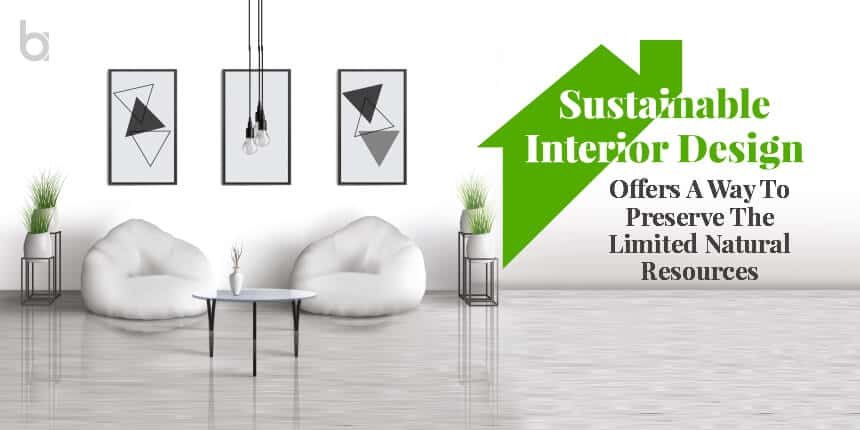In 2018, the global interior design market was valued at the 140,793.4 million US dollars and is projected to increase significantly at a CAGR of 9.2% from 2019 to 2028. Through the history of interior designing, the market has been majorly divided into residential designing and commercial designing. The economic aspect for interior designing is remarkable and it’s going to be one of the leading sectors as most people want their interiors to be special and different. As the world is changing and so its priorities as well, interior designing is not only about the growth of the market but also about the conscious effort towards the environment and its safety. Many major companies devoted to CSR are trying to switch to eco-friendly interior designing.
One of the leading problems in architecture critics and design profession is the waste that results from building-deconstruction, refurbishment, or demolition. To minimize the wastage, the design methods and techniques should work towards the conservation of natural resources. It should be aided with the minimization of energy consumption and waste production with the adaptive reuse of reclaimed or salvaged products. Also, the objective of environmentally oriented design is the regeneration and restoration of reclaimed or salvaged building materials to achieve a proper eco-friendly interior designing concept.
Interior architectural design to adapt and Reuse
Interior design should be based on the rules of usefulness, availability, and creativity, which can bring beauty to the interior of every house. It can be sustained only through the evolution of our conscious and take the right steps to protect the environment. The proper use of space, using materials that can impact less on the environment and decrease in energy consumption, pollution, and waste are few methods to help the cause. If these small details are carried out honestly people might see improvement in the quality of air, and life better from yesterday. Here are a few methods to improve the interior without sacrificing quality.
- Energy-efficient way of designing
Energy consumption is one of the major contributors to climate change. Even buildings are highly responsible for a big share in the world’s greenhouse gas emissions. Architect and interior designers improve a building’s energy efficiency by reducing the amount of energy needed for heating, lighting, and other appliances, necessities, etc. Buildings can be made energy-efficient by providing renewable energy resources and non-carbon based energy resources to the building.
- Low environmental impact use of material
It is important to choose the right material and product as possible that can cause the lowest environmental impact on the sustainable future; items such as wood, wool, and stones are easily available. It is important to source materials from nature but keeping in mind the life cycle of these materials. Because nature takes time to heal and regenerate. So, the materials used in designing eco-friendly houses should be evaluated according to their life cycle.
- Innovative waste reduction in the old design
The people involved in designing the interiors are somewhere capable of reducing the wastage and implementing such a method can sustain the limited resources of our planet. It is not judicious to replace the out-dated interior decoration with the new and trendy one. The world of interior designing is also seeing changes as climate change taking its effect. So it is necessary to go creative and use the old stuff with some new flair.
- Longevity and flexibility by introducing reusable spaces
People grow as the years go by in stature and they want their personality and status should reflect in the interiors of the house. The designer should able to predetermine the expectation of the client and should allow the flexibility of spaces in the previous design. If the client asks for redesigning, they can accommodate the changes. This method will help in prolonging the use of the original structure without any demolition or reconstruction. The creative ideas have already given us the walls that can be modified, mobile furniture, modular flooring, etc. These innovations allow in maintaining designs durable, as the free space is rare to be available. The flexible methods of designing interior make it easier to handle.
- Healthy environment by cutting down on material with toxins
The offices, schools, and homes are made beautiful because people like to stay inside, but before designing the interiors different things need thorough consideration that gives us a healthy space. The quality of air, heating, ventilation, lighting, and acoustics play a major role in providing healthier work and home space. Because indoor air pollution is caused by objects that are meant to enhance their beauty. The harmful toxins released by the chemicals used to put a coat of paint on items such as furniture and other things need to be considered before choosing the objects for the decor.
- Natural light saves money and energy
The power consumption will come drastically down if the interiors are designed to use natural light in the day time. The designers should come up with innovative methods to utilize the natural sunlight for brightening the interiors. The design will bring natural light inside which is good for health as it kills germs as well as maintains healthy interiors.
Interior design and technology for a smoother transition
The smart homes need smart interiors and designers are elevating the innovations in the field of architecture and interior designing through the use of technologies such as IoT, 3D Printing, and Artificial Intelligence to design more sustainable interiors. The 3D printing technology in hands can print pieces of equipment that are eco-friendly. IoT can monitor the inner space and provide the accurate state of the house in real-time and artificial intelligence trumps them all. The AI technology is like an intelligent virtual housekeeper which does not allow the harmful toxins to spread, keep the interior ambient clean and pollution-free.





